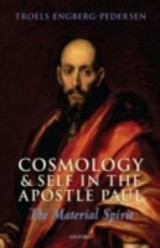Details

Cosmology and Self in the Apostle Paul
The Material Spirit|
48,74 € |
|
| Verlag: | OUP Oxford |
| Format: | |
| Veröffentl.: | 19.03.2010 |
| ISBN/EAN: | 9780191573071 |
| Sprache: | englisch |
| Anzahl Seiten: | 304 |
DRM-geschütztes eBook, Sie benötigen z.B. Adobe Digital Editions und eine Adobe ID zum Lesen.
Beschreibungen
Cosmology and Self in the Apostle Paul challenges the traditional reading of Paul. Troels Engberg-Pedersen argues that the usual, mainly cognitive and metaphorical, ways of understanding central Pauline concepts, such as 'being in Christ', 'having God's pneuma (spirit), Christ's pneuma, and Christ himself in one', must be supplemented by a literal understanding that directly reflects Paul's cosmology. Engberg-Pedersen shows that Paul's cosmology, not least his understanding of the pneuma, was a materialist, bodily one: the pneuma was a physical element that would at the resurrection act directly on the ordinary human bodies of believers and transform them into 'pneumatic bodies'. This literal understanding of the future events is then traced back to the Pauline present as Engberg-Pedersen considers how Paul conceived in bodily terms of a range of central themes like his own conversion, hismission, the believers' reception of the pneuma in baptism, and the way the apostle took the pneuma to inform his own and their ways of life from the beginning to the projected end. In developing this picture of Paul's world view, an explicitly philosophically oriented form of interpretation ('philosophical exegesis') is employed, in which the interpreter applies categories of interpretation that make sense philosophically, whether in an ancient or a modern context. For this enterprise Engberg-Pedersen draws in particular on ancient Stoic materialist and monistic physics and cosmology - as opposed to the Platonic, immaterialist and dualistic categories that underlietraditional readings of Paul - and on modern ideas on 'religious experience', 'self', 'body' and 'practice' derived from Foucault and Bourdieu. In this way Paul is shown to have spelled out philosophically his Jewish, 'apocalyptic' world view, which remains a central feature of his thought. The book states the cosmological case for the author's earlier 'ethical' reading of Paul in his prize-winning book, Paul and the Stoics (2000).
Diese Produkte könnten Sie auch interessieren:

Philosophy and Religion in German Idealism

von: William Desmond, Ernst-Otto Onnasch, Paul Cruysberghs

96,29 €















